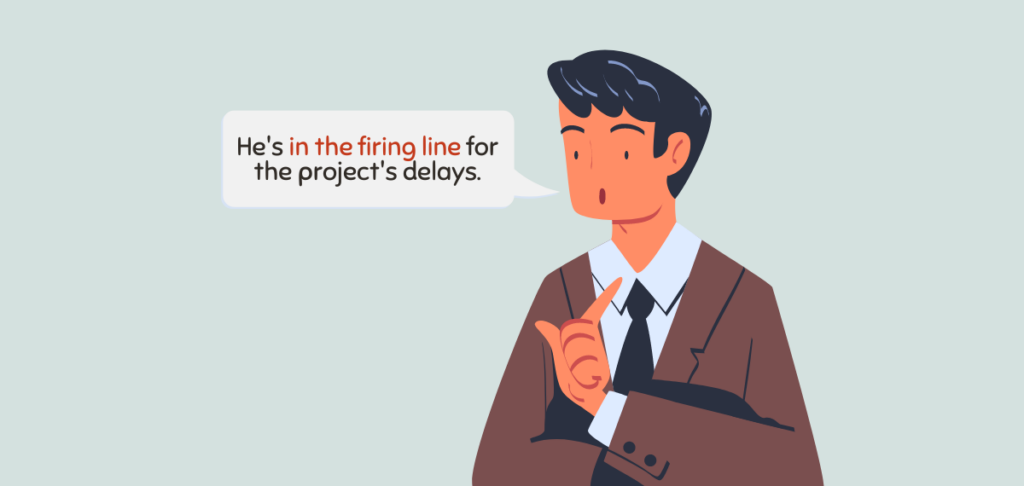Caught in the crosshairs is an idiom that means to be a target for attack, criticism, or some other form of negative attention. It is a relatively modern idiom considered to be less than 100 years old.
In English, idioms, like caught in the crosshairs, are phrases or words defined differently than their literal uses. People use idioms to communicate more effectively and reflect culture and regional dialects. Learning them can help you master the tricky nuances of the English language.
This guide discusses the popular idiomatic expression caught in the crosshairs and explores its meaning, origin, synonyms, and various ways to use it. We’ve even included a quick quiz to test your knowledge.
Keep reading to learn how to use this idiom in your materials.

What Does the Idiom Caught in the Crosshairs Mean?
The idiom caught in the crosshairs or cross hairs refers to being in a challenging situation where one is the focus of attention, scrutiny, or a potential threat.
According to the Oxford Dictionary, caught in the crosshairs/cross hairs means to be “in a situation in which you are the target or victim of somebody’s anger, violence, or blame.”
For instance, in a team meeting, Clarke is caught in the crosshairs as blame for project delays falls on her. The team’s frustration targets her, and she must navigate the scrutiny while addressing challenges and finding solutions.
You can also use the phrase literally to mean that you could be caught in the crosshairs if you were out target shooting and your companion had you in his sights.
Is It Caught in the Crosshairs or Caught in the Cross Hairs?

Both are correct. Crosshairs is generally considered the British spelling, while cross hairs is generally used as the American English spelling. The word can also be hyphenated—cross-hairs.
However, the single-word version, crosshairs, is more common and widely used nowadays, especially in the phrase caught in the crosshairs. But, as with many aspects of English, usage can vary and evolve over time and across different regions.
Regardless of the version you choose to use, the most important thing is to be consistent in your spelling throughout your writing.
How Is Caught in the Crosshairs Commonly Used in Context?
Caught in the crosshairs is a potent idiom that vividly conveys the feeling of being under intense scrutiny or facing a challenging situation. Explore how this expression is commonly used, discover examples in various contexts, and glean valuable tips for incorporating it effectively into your language use.
What Are the Different Ways to Use Caught in the Crosshairs?
The idiom is always used in a negative sense and many different circumstances, including the following:
- Under scrutiny: “The company was caught in the crosshairs of a regulatory investigation.”
- In a difficult situation: “Abby was caught in the crosshairs of a public outrage after the recent scandal.”
- Dispute between two parties: “Jaha found himself caught in the crosshairs of the two warring factions.”
- Facing a personal challenge: “After losing his job, Kane was caught in the crosshairs of financial insecurity.”
Where Can You Find Examples of Caught in the Crosshairs?
Although used informally and casually, caught in the crosshairs is a popular idiom and is regularly used to express finding oneself in a tricky situation. You’ll find the idiom used in everyday conversation, as well as many of the following media:
- Literature
- Movies and TV shows
- Songs
- Conversations and personal anecdotes
- Online resources
Here are some examples:
Meanwhile, as the UK and the European Union try to hammer out a Brexit deal in the next three weeks, Ahmad said that he did not expect Jamaica to get caught in the cross hairs. (Jamaica Gleaner)
Pilloried for his failed stint as Brazil’s health minister and caught in the crosshairs of a Senate probe on the pandemic, General Eduardo Pazuello sought refuge last week before a friendly audience at a political rally in Rio de Janeiro. (Reuters)
What Are Some Tips for Using Caught in the Crosshairs Effectively?
Here are some tips for using caught in the crosshairs effectively in everyday writing and conversations:
- Use appropriate context: The idiom should be used in circumstances when someone faces intense pressure or is in a conflict.
- Keep your message clear: Be sure to clearly stress the pressures involved and why it’s right to say someone is caught in the crosshairs.
- Avoid overusing the idiom: Overuse can dilute the impact of the phrase. Keep it for times when the situation’s pressure and intensity are comparable to being caught in the crosshairs.
- Know your audience: Ensure that your audience understands the idiom or provide them with sufficient context.
- Ensure the idiom is appropriate: When using this idiom in writing, ensure it fits the tone and style of the piece, especially if you’re writing formally.
- Be mindful of your audience: Understand that this idiom can sound threatening or imply danger to the recipient, and be mindful of the emotional impact it could have on your audience.
What Is the Origin of the Idiom Caught in the Crosshairs?

Caught in the crosshairs came into use in the mid-20th century and alludes to the crosshairs or cross hairs in a gun sight that must align when aiming at a target. Crosshairs is another name for reticles, found on the aiming scopes of firearms and other optical devices, like microscopes or telescopes.
Crosshairs are two straight lines, one vertical and one horizontal, intersecting centrally. The shooter places that intersection point on the target he wishes to aim at. Therefore, to be caught in the crosshairs is to be aimed at by a firearm literally.
How Did the Idiom Evolve Over Time?
The idiom has maintained its metaphorical essence over time, consistently conveying the sense of being under scrutiny or facing a challenging situation. Its roots in firearms optics make it a vivid expression, enduring in its ability to capture the intensity and focus associated with being caught in the crosshairs.
What Are Some Related Terms to Caught in the Crosshairs?
To fully understand its idiomatic use, you should pay close attention to context and fully understand the phrase’s meaning. Being conversant with these related terms can help you know how to define and use the idiom properly.

Synonyms
- In the line of fire
- Between a rock and a hard place
- In the firing line
- In the hot seat
- Under fire
- In the crossfire
- Under scrutiny
- In the spotlight
Antonyms
- Out of harm’s way
- Free from danger
- Safe and secure
- Protected from attack
- Not in the line of fire
- Not targeted
Caught in the Crosshairs: Test Your Knowledge!
Choose the correct answer.
Let’s Review
Caught in the crosshairs, a modern idiom for becoming a target of criticism illustrates English language dynamism. Idioms like this convey cultural nuances, enhancing communication.
Explore more idioms on our site to unravel English’s diverse expressions, fostering language proficiency and cultural insight. Mastering idioms is a gateway to effective communication. Happy exploring!
Related Articles:
